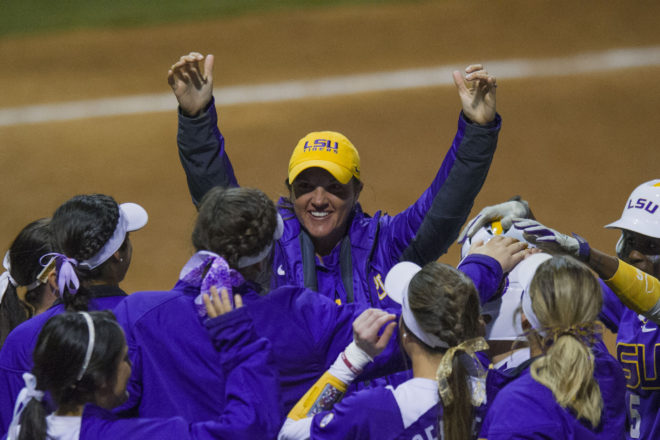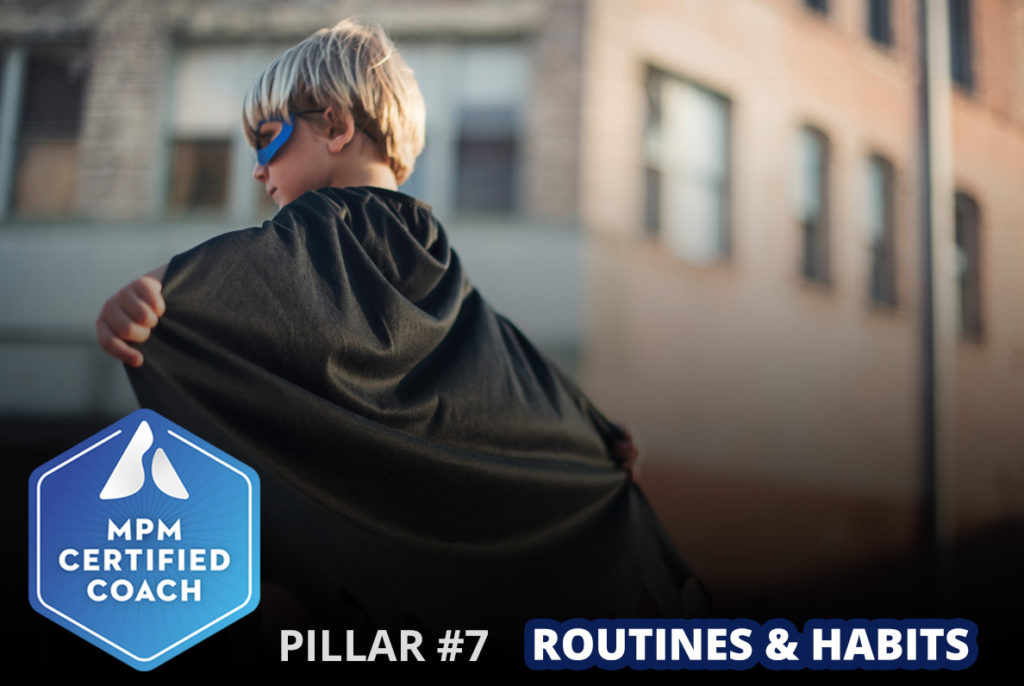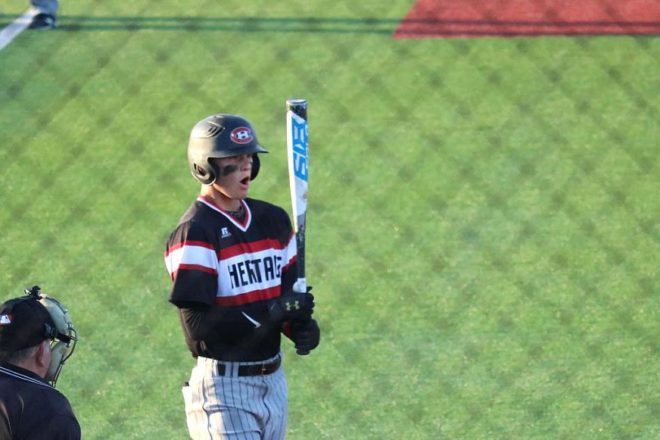
Get this FREE MiniCourse to help your athletes perform their best, overcome any obstacle, and stay focused under pressure.
You can know all the right information, but if you do not put it into ACTION—what good does it do for you?
The purpose of any routine is to build more trust, consistency, and confidence in performance.
Think about those three things for a minute.
These are concepts of athletic performance often glossed over. But consider how developing these characteristics in those you coach would impact their success in a real, tangible way.
How much better will an athlete perform who TRUSTS that he/she can go out and truly play at the highest level possible…
… How being consistent in performance from game-to-game would not only help their personal success, but also the success of the entire team.
… The confidence of KNOWING you will face adversity—yet fully believing you have what it takes to overcome it and perform your best, despite challenges.
I get fired up just thinking about it!
This article explores routines you can use to keep athletes in the present moment and focused on the process of playing one pitch/play/etc. at a time.
These routines will provide the necessary perspective to maintain a positive mentality, and that can be used before, during, and after competition to give you and those you coach the best chance for success.
SUPERMAN USED SEGMENTATION AND SEPARATION TECHNIQUES—AND SO SHOULD YOU
A huge obstacle standing in the way of elite performance is getting athletes to let go of all the “stuff” that’s happening OUTSIDE of their sport—and direct all of their energy and focus to the competition they’re about to step into.
Segmentation routines are used to help separate one from the many different activities an athlete has. In addition to being an athlete, the people you coach have school, social activities, and family—to name a few.
All of these carry unique demands that can drain the energy and focus needed for elite performance.
While that’s part of life, there IS something you can do to mitigate the performance-zapping effects of these outside demands and help athletes “show up” more in competition.
One of the best techniques to help segment and separate the many activities our athletes face is to use something physical (perhaps entering the field or complex) to help them change their mental state.
To “flip the switch”, turning OFF all of the outside distractions—and locking in their focus and energy for competition.
It is here that we look to Superman for guidance…
Superman is the ultimate pro at segmentation and separation prior to and after his performances. He walks into the phone booth as Clark Kent, super nerd (student), and comes out as Superman (competitive warrior).

His self-transformative process is the perfect example of mental performance mastery segmentation routines. The nearest phone booth is the symbolic equivalent of his locker room: As he changes his clothes, his perspective changes, as he adopts a mental performance mastery mentality.
It is very important that some players understand their playing personality, and the need to change it if needed. Some players are sweet, innocent, quiet kids.
But they need to transform into a more aggressive, physically big, confident and different type of player to maximize their individual and the team’s chance of success.
Teach your athletes this concept. Tell them that as they step into the locker room each day—whether that’s preparing for practice or a game—they are stepping into the “phone booth” of competition.
All the other stuff they have going on in their lives will still be there in a few hours, but for now, it’s time to set that aside and LOCK IN on becoming a competitive warrior.
As they change their clothes to get ready, advise them to think about releasing the “mental bricks” from their personal life as they get into performance mentality.
Changing clothes is the process—the physical action serving as a symbol—to separate the mentality needed to succeed in the various segments of life.
The establishment of this routine will give your athletes the best chance to be in the present for whatever they are about to perform, and to have a consistent mentality that allows them to perform their best when it matters most.
When to use it: Pre-game routine.
CIRCLE OF FOCUS
The circle of focus is an imaginary circle that you step into and engage in a present-moment focus with your energy and attention going out towards the action taking place.
For example, pitchers step into their circle of focus after a strikeout, knowing that the next hitter is a new battle.
Think of it as a “reset.”
When things are going well, you step into your circle of focus to ensure you stay on the top of your game.
When things aren’t going so well, you step into the circle of focus to refocus, let go of whatever distractions or negativity is holding you back so you can move forward in a posture that’s conducive to success.
The goal is to step “in” and “out” of the circle of focus throughout competition based on when you need maximum energy and focus—and when you can take a few moments to rest and recover.
When it’s “go time” your athletes can use one to three mental strategies to keep focus locked into the present:
- Deep breath on a focal point before each play. In baseball, for example, a pitcher could pause and take a deep breath on a focal point prior to each pitch.
- Visualization/mental imagery of execution of the next pitch/play.
- Verbalize—positive, confidence-building self-talk.
These strategies will assist athletes in focusing on performing in the present moment. Routine use of one or more of the strategies will help them enter that circle of focus and gain control of their mind.
Mind control leads to body control, which leads to skill/performance control, and being in control of all aspects of yourself gives you the best chance for performance excellence.
When to use it: During competition.
PERFORMANCE REVIEW
A routine review of the most recent performance is one of the best post-game routines you can establish for those you coach.
Keeping a mental performance mastery journal chronicles progress and development in mental and physical conditioning, providing athletes with a valuable resource for self-improvement.
This provides the opportunity for athletes to reflect upon past performances and recall how they performed, how they were feeling, what they believe they need to improve, what performance adjustments need to be made, whether or not past performance adjustments worked, etc.
The best time to integrate this performance routine review is directly after the performance, while it is still fresh. Have your athletes record all the information about their performance that is applicable to future improvement.
Advise them to focus on areas they can improve AND areas where they performed well.
Doing this serves as a reminder to continue performing these aspects of the game and will help “catch” aspects of performance that may be slipping.
When to use it: Post-game routine.
FINAL THOUGHTS
A routine is a skill that needs to be practiced regularly so that it becomes, well, routine. You cannot just do a routine once and expect to have it show up for you in the heat of the competition.
The routine has to be something you do on a daily basis in practice as well as games. Game-like practice is critical for mental performance mastery development because it enhances the ability to stick with routines in pressure situations.
Ultimately, the purpose of routines is to provide something physical to assist us with something mental.
Remember, practice makes permanent. You want your athletes to drill these routined during preparation, making them such a permanent part of the performance process that they unconsciously tune into a predetermined mindset for performance excellence.
YOUR NEXT MOVE: IF YOU WANT TO TAKE YOUR COACHING TO THE NEXT LEVEL, YOU NEED TO MASTER THE MENTAL SIDE OF PERFORMANCE
Knowing the what, when, and how of coaching mental performance—and trying to fit all of the pieces together on your own—can be burdensome.
That’s why I created the Mental Performance Mastery (MPM) Certification. Inside the MPM Certification, I’ll teach everything you need to add this crucial skill set to your coaching toolbox.
You will learn how to help your athletes and clients overcome mental barriers that trip them up and build the habits, mindset, and behaviors they need to be at their best when it matters most.
Not only will you develop a deep knowledge of the ten most valuable mental skills needed for peak mental performance, but you’ll also have a proven method for consistently and predictably developing these skills in those you coach.
The MPM Certification will open to new students for a limited time only twice a year (May and November). Join the free Insider’s List below to save $200 on the certification and be the first to know when it goes live.

